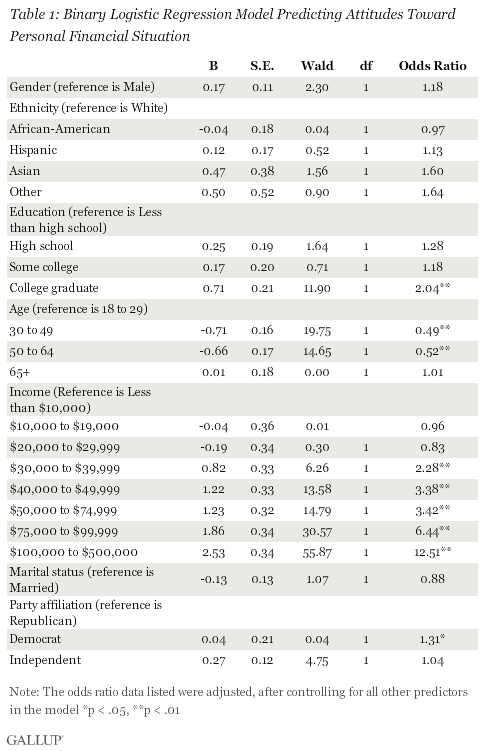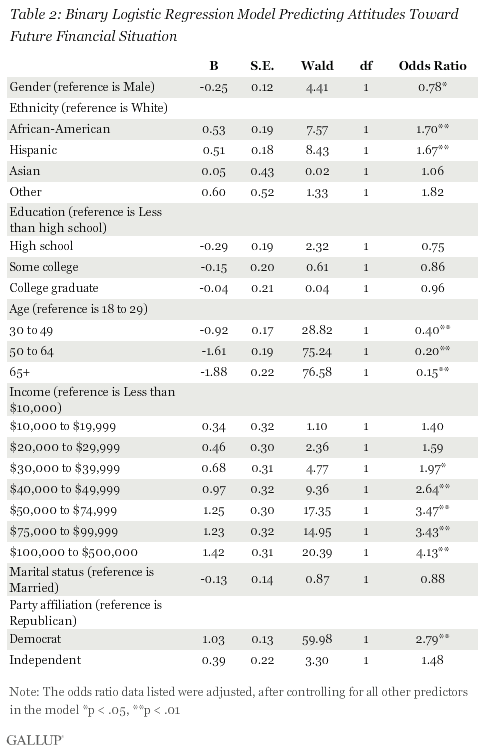PRINCETON, NJ -- Younger Americans are significantly more optimistic about the direction of their personal finances than those who are older, with 73% of those aged 18 to 29 saying their financial situation is getting better, compared with 23% of those 65 and older. However, age makes relatively little difference in Americans' views of their current financial situation -- those at the younger and older ends of the spectrum are slightly more positive than those who are middle-aged.
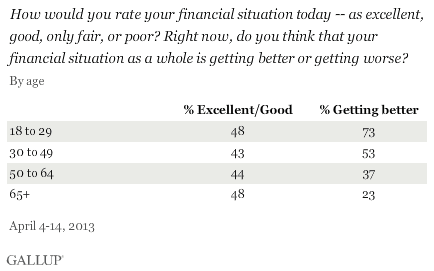
These data are from Gallup's Economy and Personal Finance survey, conducted annually since 2001. This year's survey includes 2,017 interviews, conducted April 4-14. The survey shows that 45% of all Americans rate their financial situations as excellent or good and 47% say their finances are getting better, improved somewhat from recent years, but generally still not recovered to the solid majority levels measured before 2008.
Young people may be the most optimistic about the direction of their finances because they are just starting their adult lives, and still have a significant chance of upward economic mobility ahead. This youthful financial optimism in this survey tapers off as Americans age. Older Americans thus appear to view their financial situations as fixed and on a steady course rather than improving -- although the fact that seniors rate their current finances as positively as any other age group suggests that many older Americans are quite satisfied with their financial situation, even if it is static.
BIG TRENDS: Read more in our on going series The New American Consumer
Men, Blacks, Hispanics, and Democrats More Optimistic About Finances
Age is one of the most powerful correlates of Americans' outlook for their personal financial situations, but by no means the only one. A comprehensive statistical analysis reveals the variables that are significantly predictive of Americans' financial self-assessment -- both present and future -- after adjusting for all other predictors (see more detailed information on page 2):
- Income: As Americans' incomes rise above $30,000 a year, Americans become increasingly positive about this current financial situation. They also become more optimistic about their future finances as their incomes rise above $40,000 a year.
- Gender: Men are significantly more optimistic than about their financial future, but both genders are equally positive toward their current situations.
- Education: College graduates are more positive about their current financial situation. But there are no meaningful differences in financial outlook by education status.
- Race/Ethnicity: Blacks and Hispanics are more optimistic than whites about their future finances, but there are no differences in attitudes about current finances by race and ethnicity.
- Political Party: Democrats are more positive about their current financial situation and about the direction in which their finances are going.
Income, as might be expected, is by far the most influential predictor both of Americans' views of their current personal financial situation and of their optimism about the direction of their finances. The percentage of Americans who rate their financial situation as excellent or good rises from 19% among those making under $20,000 a year to 74% among those making $100,000 and more.
But, the differences in financial optimism across income categories are much narrower -- ranging from 40% to 55%. Thus, income apparently has less of an impact on how Americans view the direction of their finances than it does on their assessments of where those finances are currently.
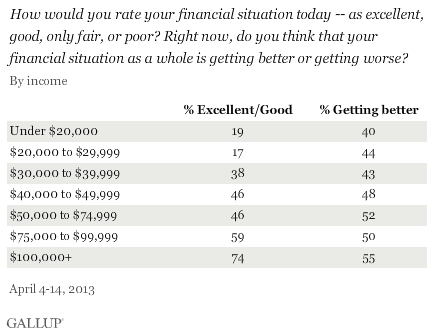
Low-income Americans are more likely to be optimistic about the direction of their finances than about their current reality. These attitudes flip, however, as income rises. Those making $75,000 or more a year are more likely to rate their current financial situation positively than they are to be optimistic about the future. The pattern strengthens among those in the highest income category of $100,000 or more a year, with 74% rating their current finances excellent or good while 55% say their financial situation is getting better.
College Graduates Most Positive About Current Financial Situation
College graduates are about twice as likely as those who didn't go to college to rate their current finances "excellent"/"good." But, there are no significant differences in expectations about future finances across educational categories.
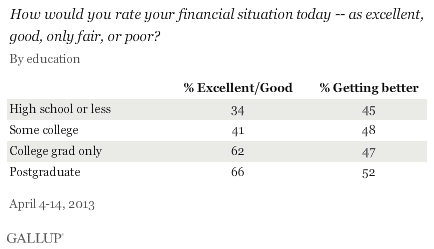
Men Slightly More Likely to See Their Finances Improving
While the statistical analysis shows there is no significant difference between men and women in views of their current financial situation, men are modestly more optimistic than women about their financial future.
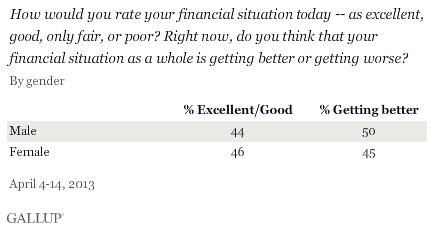
Nonwhites See Brighter Financial Future for Themselves
Whites and nonwhites share similar perceptions of their current financial situations. At the same time, they diverge in views about the direction of their finances. Blacks and Hispanics -- and nonwhites more generally -- are about 20 percentage points more likely than whites to say their finances are getting better.
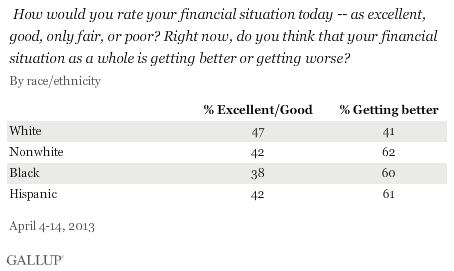
Party ID, Regardless of Demographics, Affects Americans' Views of Finances
After controlling for all demographic variables included in the model, political party affiliation is found to be a significant predictor of Americans' views of their present and their future financial situation. Democrats are statistically more likely than Republicans to rate their financial situation as "excellent" or "good," although the differences are slight.
The same pattern occurs with Americans' views of the direction of their personal finances, with a majority of Democrats (56%) saying their personal finances are getting better, compared with 48% of independents and 35% of Republicans.
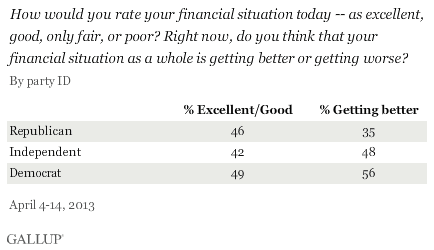
This relative Democratic optimism is partly related to the fact that the nation currently has a Democratic president. In April 2006, with Republican president George W. Bush in the White House, 47% of all Americans said their financial situation was getting better, the same as today. But the partisan picture in 2006 beneath that national average was the opposite of what it is today, with 63% of Republicans saying their financial situation was getting better, compared with 33% of Democrats.
Implications
Americans' views of their personal financial situations are clearly related to several personal and demographic characteristics, particularly income and age. The fact that income is significantly related to ratings of one's personal financial situation, both current and future, is in line with expectations, as is the fact that college graduates rate their current situation more positively than those with lower levels of education.
It is encouraging to find that younger Americans are very positive about their personal financial situations on a relative basis, and are particularly likely to believe that their financial situations are getting better rather than getting worse -- more so than any other age group.
This optimism on the part of young Americans -- despite current news coverage of the difficulties young people may have in finding jobs -- underscores a continuing faith in the possibilities of the American Dream, at least as far as finances are concerned.
Politically speaking, the data make it clear that financial optimism and pessimism about the future are bound up with who happens to be president; Democrats are more optimistic now while Republicans were more optimistic during the Bush years. Whether these partisan-driven attitudes result in real-world differences in financial behavior requires further investigation.
Survey Methods
Results for this Gallup poll are based on telephone interviews conducted April 4-7 and April 11-14, 2013, with a random sample of 2,017 adults, aged 18 and older, living in all 50 U.S. states and the District of Columbia.
For results based on the total sample of national adults, one can say with 95% confidence that the margin of sampling error is ±3 percentage points.
Interviews are conducted with respondents on landline telephones and cellular phones, with interviews conducted in Spanish for respondents who are primarily Spanish-speaking. Each sample of national adults includes a minimum quota of 50% cellphone respondents and 50% landline respondents, with additional minimum quotas by region. Landline telephone numbers are chosen at random among listed telephone numbers. Cellphone numbers are selected using random digit dial methods. Landline respondents are chosen at random within each household on the basis of which member had the most recent birthday.
Samples are weighted to correct for unequal selection probability, nonresponse, and double coverage of landline and cell users in the two sampling frames. They are also weighted to match the national demographics of gender, age, race, Hispanic ethnicity, education, region, population density, and phone status (cellphone only/landline only/both, cellphone mostly, and having an unlisted landline number). Demographic weighting targets are based on the March 2012 Current Population Survey figures for the aged 18 and older U.S. population. Phone status targets are based on the July-December 2011 National Health Interview Survey. Population density targets are based on the 2010 census. All reported margins of sampling error include the computed design effects for weighting.
In addition to sampling error, question wording and practical difficulties in conducting surveys can introduce error or bias into the findings of public opinion polls.
For more details on Gallup's polling methodology, visit www.gallup.com.
